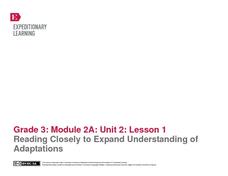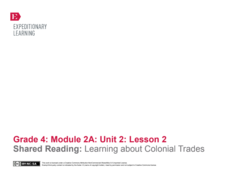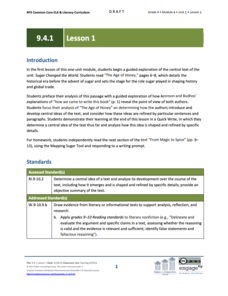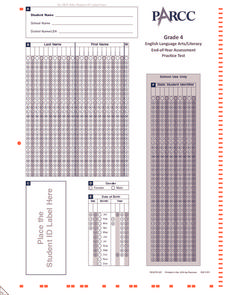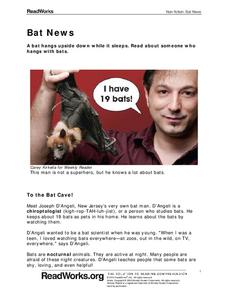Polk Bros Foundation
Meet the Nonfiction Main Idea Challenge
Help your class develop the ability to determine a main idea with a packet of materials that you can introduce and use over a period of time. The packet includes some information for the teacher and rationale for the exercises. There are...
EngageNY
Reading Closely to Expand Understanding of Adaptations
Third graders work to determine the main idea, recall key details, and answer questions using an informational text on the topic of animal adaptations. Using the non-fiction text "Staying Alive: Animal Adaptations" (provided) the teacher...
Polk Bros Foundation
A Way to Analyze Paragraphs to Figure Out the Main Idea of a Nonfiction Text
Shrink up a section by asking pupils to write down the main idea for each of seven paragraphs. There is a space provided for each main idea. When students have completed this portion, they write down what they think to be the central...
Polk Bros Foundation
I Can Identify a Nonfiction Writer's Main Idea and Supporting Examples
Use this page to quickly identify the central idea of a text and organize ideas for writing an informational or explanatory text. The worksheet is split into two parts. In the first part, pupils note down the main idea and supporting...
Polk Bros Foundation
How to Summarize a Non-Fiction Passage
After reading a text, one way to find out how much your class comprehended is to ask your pupils to summarize. This worksheet helps class members prepare for writing a summary of a nonfiction text. They note down the topic, up to eight...
Polk Bros Foundation
Comprehensive Nonfiction Reading Questions
Analyze any nonfiction text with the set of questions on this sheet. Class members practice inferring by noting the main idea and purpose of a passage. They also analyze an opinion in the passage and write a brief summary. See the...
DePaul University
The Working Tools of Insects
The animal kingdom is full of interesting organisms that have unique ways of surviving. Children read about different insects that have special tools for building homes and protecting themselves. When finished, learners identify the main...
DePaul University
Egypt
The country of Egypt is more than just big pyramids and ancient pharaohs. After reading a brief overview of this African nation, young learners will demonstrate their understanding of the text by identifying the main idea and supporting...
Scholastic
Comprehension During Independent Reading
Ideal for a language arts class, literary unit, or independent reading assignment, a set of reading worksheets address a wide array of skills. From poetic elements to nonfiction text features, you can surely find a valuable resource in...
DePaul University
Settlement
Early settlers in the American Midwest experienced constant struggle. This reading passage describes for young learners the hardships of homesteaders as they journeyed west and sought to start a new life. When finished, students identify...
Curriculum Corner
Informational Text Graphic Organizers
Analyze informational text with a set of three worksheets that focus on the main idea and supporting details, and reinforces note taking skills, and the use of context clues to define new words.
EngageNY
Shared Reading: Learning About Colonial Trades
Trading in Colonial America is the focus of a lesson plan that boosts reading skills. As a class, scholars examine the informational text for crucial details, use their newfound knowledge to share information with their peers, and write...
EngageNY
Close Reading: Excerpt 2 of “The Digital Revolution and the Adolescent Brain Evolution”
Help scholars comprehend a challenging text. Using the resource, pupils read excerpts from an article about the digital revolution and adolescent brain development. As they read, they answer text-dependent questions and complete a close...
ReadWriteThink
Captioning the Civil Rights Movement: Reading the Images, Writing the Words
Scholars boost their knowledge of the Civil Rights Movement with a lesson plan that challenges writers, readers, and historians to analyze primary sources and caption their observations. By way of reading, writing, discussion,...
Core Knowledge Foundation
Colonial Towns and Townspeople Tell It Again!™ Read-Aloud Anthology
A read-aloud anthology focuses on colonial towns and townspeople. Over three weeks, young scholars listen to stories, participate in discussions about town life, practice word work, and complete an extension activity with each lesson.
Fluence Learning
Writing About Informational Text: Music and the Brain
Even if you've never picked up a musical instrument, chances are that music has directly impacted your mental and emotional development. Sixth graders engage in a reading activity in which they read two articles on the impact of music on...
Baruch College Writing Center
Summarizing, Paraphrasing, and Quoting Workshop
What's the difference between summarizing and paraphrasing? Show class members how to find the main ideas from informational text and condense it, restate it, or quote it directly with a series of educational activities based on two...
EngageNY
Grade 9 ELA Module 4, Unit 1, Lesson 1
How do writers introduce and develop the central ideas in a text? To answer this question, ninth graders closely examine "The Age of Honey," the opening chapter in Marc Aronson and Marina Budhos' Sugar Changed the World: A Story of...
Mark Twain Media
Understanding Informational Text Features
Everything you need to know about informational text features can be found in this resource. Recognizing these types of text features and how they are used in text allows readers to better understand information. Teachers can use this as...
Curated OER
End-of-Year Practice Test (Grade 4 ELA/Literacy)
The time has come to find out what your fourth grade readers have learned after another year of hard work. This Common Core-designed practice assessment provides two reading passages, one narrative and one expository, that children must...
Curated OER
End-of-Year Practice Test (Grade 5 ELA/Literacy)
The end of the year has arrived, which means it's time to find out exactly what your fifth graders have learned over the past few months. With the help of this Common Core-designed assessment that includes two narrative passages and 12...
Curated OER
Nonfiction Genre Mini-Unit: Persuasive Writing
Should primary graders have their own computers? Should animals be kept in captivity? Young writers learn how to develop and support a claim in this short unit on persuasive writing.
Curated OER
Practice Book O
Whether you need resources for reading comprehension, literary analysis, phonics, vocabulary, or text features, an extensive packet of worksheets is sure to fit your needs. Based on a fifth-grade curriculum but applicable to any level of...
Read Works
Bat News
Get the bat facts with a short nonfiction reading passage. After reading the passage, readers respond to questions that focus on main idea, inferencing, vocabulary in context, and author's purpose.



